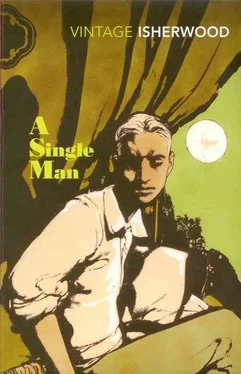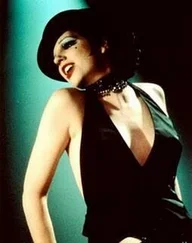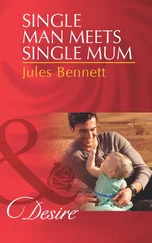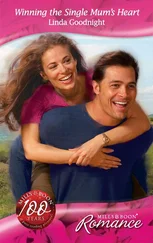We’re getting maudlin, he says, trying to make his will choose between halibut, sea bass, chopped sirloin, steaks. He feels a nausea of distaste for them all; then sudden rage. Damn all food. Damn all life. He would like to abandon his shopping-cart, although it’s already full of provisions. But that would make extra work for the clerks, and one of them is cute. The alternative, to put the whole lot back in the proper places himself, seems like a labour of Hercules; for the overpowering sloth of sadness is upon him. The sloth that ends in going to bed and staying there until you develop some disease.
So he wheels the cart to the cash-desk, pays, stops on the way out to the car-lot, enters the phone-booth, dials.
‘Hello.’
‘Hello, Charley.’
‘ Geo —!’
‘Look – is it too late to change my mind? About tonight? You see – when you called this morning – I thought I had this date – But I just heard from them that —’
‘Of course it isn’t too late! ’ She doesn’t even bother to listen to his lying excuses. Her gladness flashes its instantaneous way to him, even faster than her words, across the zigzag of the wires. And at once Geo and Charley are linked, are yet another of this evening’s lucky pairs, amidst all of its lonely wanderers. If any of the clerks were watching, they would see his face inside the glass box brighten, flush with joy like a lover’s.
‘Can I bring you anything? I’m at the market —’
‘Oh no – no thank you, Geo dear! I have loads of food. I always seem to get too much, nowadays. I suppose it’s because —’
‘I’ll be over in a little while, then. Have to stop by the house, first. So long —’
‘Oh, Geo – this is nice! Au revoir!’ But he is so utterly perverse that his mood begins to change again before he has even finished unloading his purchases into the car. Do I really want to see her? he asks himself; and then, what in the world made me do that? He pictures the evening he might have spent, snugly at home, fixing the food he has bought, then lying down on the couch beside the bookcase and reading himself slowly sleepy. At first glance, this is an absolutely convincing and charming scene of domestic contentment. Only after a few instants does George notice the omission which makes it meaningless. What is left out of the picture is Jim, lying opposite him at the other end of the couch, also reading; the two of them absorbed in their books yet so completely aware of each other’s presence.
Back at home, he changes out of his suit into an army surplus store khaki shirt, faded blue denims, moccasins, a sweater. (He has had doubts from time to time about this kind of costume; doesn’t it give the impression that he’s trying to dress young? But Jim used to tell him, No, it was just right for him – it made him look like Rommel in civilian clothes. George loved that.)
Just when he’s ready to leave the house again, there is a ring at his doorbell. Who can it be at this hour?
Mrs Strunk!
(What have I done that she can have come to complain about?)
‘Oh, good evening —’ (Obviously she’s nervous, self-conscious; very much aware, no doubt, of having crossed the frontier-bridge and being on enemy territory.) ‘I know this is terribly short notice. I – we’ve meant to ask you so many times – I know how busy you are – but we haven’t gotten together in such a long while – and we were wondering – would you possibly have time to come over for a drink?’
‘You mean, right now?’
‘Why, yes. There’s just the two of us at home.’
‘I’m most terribly sorry. I’m afraid I have to go out, right away.’
‘Oh. Well. I was afraid you wouldn’t have time. But —’
‘No, listen,’ says George, and he means it; he is extremely surprised and pleased and touched. ‘I really would like to. Very much indeed. Do you suppose I could take a rain-check?’
‘Well, yes, of course —’ But Mrs Strunk doesn’t believe him. She smiles sadly. Suddenly it seems all-important to George to convince her.
‘I would love to come. How about tomorrow?’
Her face falls. ‘Oh well, tomorrow. Tomorrow wouldn’t be so good, I’m afraid. You see, tomorrow we have some friends coming over from the Valley, and —’
And they might notice something queer about me, and you’d feel ashamed, George thinks, okay, okay.
‘I understand, of course,’ he says, ‘but let’s make it very soon, shall we?’
‘Oh yes ,’ she agrees fervently, ‘Very soon —’
Charlotte lives on Soledad Way, a narrow uphill street which at night is packed so tight with cars parked on both sides of it that two drivers can scarcely squeeze past each other. If you arrive after its residents have returned home from their jobs, you will probably have to leave your car several blocks away, at the bottom of the hill. But this is no problem for George, because he can walk over to Charley’s from his house in less than five minutes.
Her house is high up on the hillside, at the top of three flights of lopsided rustic wooden steps, seventy-five of them in all. Down on the street level there is a tumbledown shack intended for a garage. She keeps it crammed to the ceiling with battered trunks and crates full of unwanted junk. Jim used to say that she kept the garage blocked in order not to be able to own a car. In any case, she absolutely refuses to learn to drive. If she needs to go some place and no one offers to give her a ride, well then, that’s too bad, she can’t go. But the neighbours nearly always do help her; she has them utterly intimidated and bewitched by this Britishness which George himself knows so well how to employ, though with a different approach.
The house next to Charlotte’s is on the street level. As you begin to climb her steps, you get an intimate glimpse of domestic squalor through its bathroom window (it must be frankly admitted that Soledad is one whole degree socially inferior to Camphor Tree Lane): a tub hung with panties and diapers, a douche-bag slung over the shower-pipe, a plumber’s snake on the floor. None of the neighbour’s kids are visible now, but you can see how the hillside above their home has been trampled into a brick-hard slippery surface with nothing alive on it but some cactus. At the top of the slope there is a contraption like a gallows, with a net for basketball attached to it.
Charlotte’s slice of the hill can still just be described as a garden. It is terraced, and a few of the roses on it are in bloom. But they have been sadly neglected; when Charley is in one of her depressive moods, even the poor plants must suffer for it. They have been allowed to grow out into a tangle of long thorny shoots, with the weeds thick between them.
George climbs slowly, taking it easy. (Only the very young are not ashamed to arrive panting.) These outdoor staircases are a feature of the neighbourhood. A few of them have the original signs on their steps which were painted by the bohemian colonists and addressed, apparently, to guests who were clambering upstairs on their hands and knees, drunk. Upward and onward. Never weaken. You’re in bad shape, sport. Hey – you can’t die here ! Ain’t this heaven?
The staircases have become, as it were, the instruments of the colonists’ posthumous vengeance on their supplanters, the modern housewives; for they defy all labour-saving devices. Short of bringing in a giant crane, there is absolutely no way of getting anything up them except by hand. The icebox, the stove, the bathtub and all of the furniture has had to be pushed and dragged up to Charley’s by strong savagely cursing men. Who then clapped on huge extra charges, and expected triple tips.
Читать дальше












